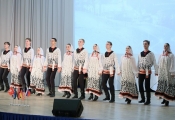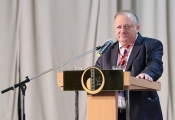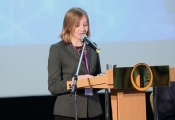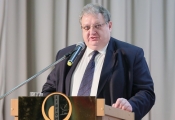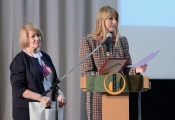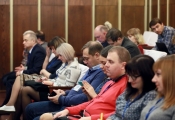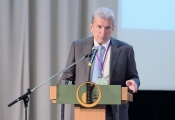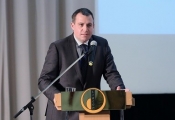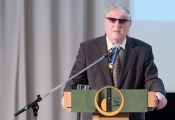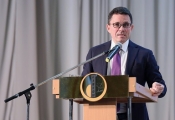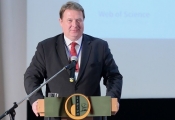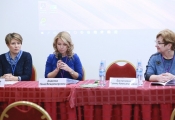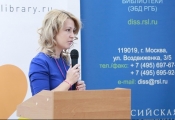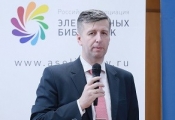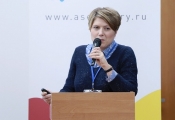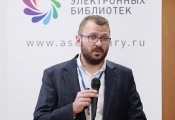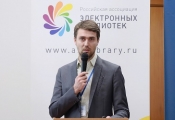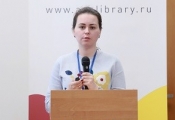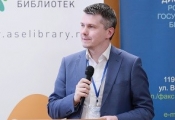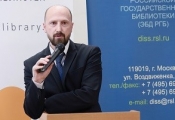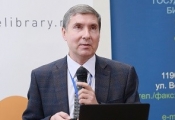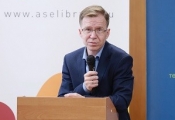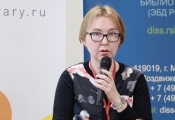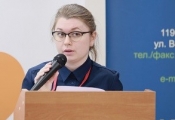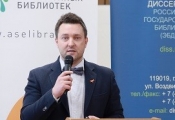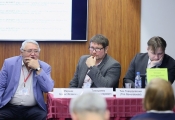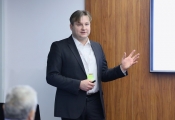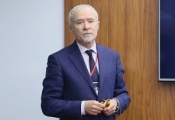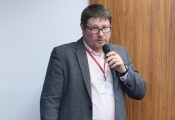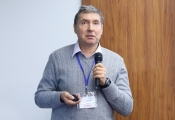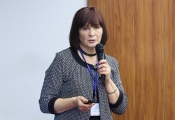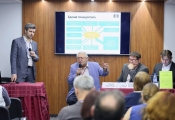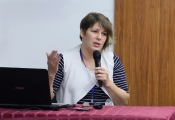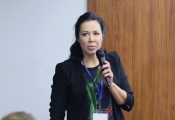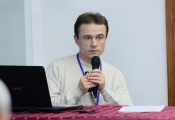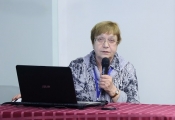21st International conference and exhibition “LIBCOM 2017: Information Technologies, Computer Systems and Publications for Libraries”
26.12.2017
20 – 24 November 2017 tourist and hotel complex “Tourcenter” of the city of Suzdal (Vladimir region) hosted the 21st International conference and exhibition “LIBCOM 2017: Information Technologies, Computer Systems and Publications for Libraries”.
The event was organized by:
- Ministry of Education and Science of the Russian Federation;
- Ministry of Culture of the Russian Federation;
- Russian National Public Library for Science and Technology;
- International Association of Users and Developers of Electronic Libraries and New Information Technologies;
- National Library Association “Libraries of the Future”.
The conference was devoted to the following subject matters: real condition and prospects of new computer and Internet technologies in library practice, federal projects and programmes of the Ministry of Education and Science of the Russian Federation and the Ministry of Culture of the Russian Federation, innovations in contemporary education technologies, legal aspects of work of libraries and information providers, electronic libraries and resources, projects for regional libraries, informatization of school libraries, etc.
The opening ceremony took place 21 November 2017. It was started by folk ensemble “Rosinka” of the Vladimir Regional College of Culture and Arts. Then Yakov Shraiberg, director of the Russian National Public Library for Science and Technology (RNPLS&T) and chair of the Organizing Committee of the “LIBCOM” conference, greeted the audience. He pointed out that “LIBCOM” turned to be a regular entry of a national and international library and information calendar of events, and it was interesting for the specialists of the sphere of its own and for the related spheres as well. Those who had once participated in it were coming again and again. The speaker expressed his hope for the conference to remain in demand, for its participants obviously benefitted from that. To conclude, Yakov Leonidovich wished the participants to be healthy, lucky and successful, and to set new useful contacts. Then he read out the greeting letter from deputy Prime Minister of the Russian Federation Arkady Dvorkovich.
The latter emphasized the fact of the conference maintaining high research and practical level of communication for a range of years which gave a chance to the specialists of different spheres exchange experience and create favourable environment for information support of science, culture and education. Mr Dvorkovich wished all the participants to work fruitfully.
Counsellor of Library Division of the Department of Science and Education of the Russian Federation of the Ministry of Culture of the Russian Federation Natalia Andreeva read out the greeting message by first deputy Minister of Culture of the Russian Federation Vladimir Aristarkhov. The message pointed out the high professional level of the conference, urgency and relevancy of the themes discussed. The conference made the attendees generate new ideas, set interesting tasks, work out promising solutions. The “LIBCOM” events were diverse but they were all aimed at further development of library work. Mr Arictarkhov wished the conference participants to work successfully and to get bright impressions from staying at the old Suzdal land.
Mikhail Kolkov, deputy Governor of the Vladimir region, read out the greeting message from Governor of the Vladimir region Svetlana Orlova. The message informed that the region had made considerable progress in the sphere of development of digital libraries. In particular, there was started a library of a regional importance “Zemlia Vladimira” (“Vladimir Land”) which could boast of approximately 4500 full-textual editions. Implementation of information technologies contributed to realization of large – scale multi – format projects, and the conference was a significant event to help in developing library system. Ms Orlova wished the participants to enjoy their time and communication with colleagues.
Svetlana Zhurova, first deputy chair of the Committee on Foreign Affairs of the State Duma of the Federal Assembly of the Russian Federation, pronounced her greeting speech and announced the results of creative works contest of 2017 “Library as an Institute of Social Dialogue in the Context of Fulfilment of Message by President of the Russian Federation Vladimir Putin to Federal Assembly dated by 01.12.2016”. The nomination “Experience and strategy of library work in projects of development of culture and leisure activities in Russian regions” had its winner “Stable image with the young is a half of the battle won by the modern libraries” by the Astrakhan Youth Library. In nomination “Prospective directions of work of modern libraries of Russia as centres of social dialogue between the representatives of the civil community and the authorities as it concerns creation and support of a modern habitat” the winner turned out to be “Culture Lift” by the Municipal State Financed Establishment of Culture “Library Union of Cheboksary”. Nomination “Libraries and volunteer movement – Culture. Education. Ecology” witnessed its awardee “Volunteer projects in library work as a fact of a social negentropy, from the experience of the Central Library of the City of Tutayev”.
The first speech of the plenary meeting “E-books vs printed books in the information environment – has the balance been achieved?” was pronounced by Yakov Shraiberg, the director of the RNPLS&T. He started by quoting Friedrich Nietzsche “You shouldn’t invent too much. Otherwise you will generate the problems which did not exist from the beginning”. The modern digital social environment which had been developing actively with the beginning of the new century could not help influencing social life, moreover it did influence the market of educational and library services. The confrontation of printed books and electronic ones had counted over 10 years of history, still the year of 2017 had to see its termination. By French philosopher Voltaire, “The prolonged discussion means that the both parties are wrong”. Mr Shraiberg spoke on printed, electronic and audio books, on book markets, book price, popularization of reading as an activity and its crisis in Russia. Still the speaker emphasized that the perspective of book – publishing activity in Russia seemed to be promising, and there existed grounds to think that the tendency of growth of numbers and of number of copies would sustain. The segment of the ‘pirate’ content was decreasing, and it meant that the legal identity of electronic information users was strengthening its positions, as well as it was witnessing a huge educational work performed by librarians, publishers, teachers of higher education institutions, etc. The speech was terminated by quotation “Have you got used to reading from computer monitors? Do not you visit book stores or libraries? Do you hope to get rid of books? Do not hope in vain! Book is like spoon, hammer, wheel or scissors – having been invented once, they’d never be replaced” (Umberto Eco, Jean-Claude Carrière).
After that the director general of the National Library of Russia Alexander Visly presented his speech “Digital resources of national libraries”. He spoke on the development of a union digital catalogue of the RSL and the NLR. The moments of printing books coming into the both of the libraries differed. At first books went to the Russian Book Chamber, several days later they arrived at the RSL where during 2-5 days they were processed, and as a result there appeared new records in the digital catalogue of the RSL. The NLR accepted the same books considerably later (the process would continue up to a month). Cataloguing at the NLR would also take more time than at the RSL. The described condition generated an effective approach when the union catalogue accepted the record from the RSL, and when the printed book would finally achieve the NLR the latter could simply borrow the bibliographic description from the union catalogue. It looked like a system of corporate cataloguing “for the two of us”. And it turned out to be more efficient than separate work of each of the libraries. The RSL and the NLR were using the same software. As a result the system had been working since May 2017. The following stage was to turn to other libraries. Then the union catalogue of the two national libraries would become available to external users, and libraries would acquire capability to borrow bibliographic records in the needed format. Opening the catalogue for external borrowing was planned for March – April 2018. The speaker pointed out that all the three national libraries of Russia were dealing with creating full – textual resources. The Russian State Library and the National Library of Russia were cooperating in the “National Digital Library” (NDL) project through which users could access those resources. While the Boris Yeltsin Presidential Library was not contributing such resources to the project yet. That was caused by the position of the Ministry of Telecom and Mass Communications of the Russian Federation basing on the regulation according to which since 1st January 2017 each publishing house had to transfer an electronic copy of each new book to the Russian State Library within the 7 – day period. Still for the moment the regulation was not fulfilled properly. The way out offered by the Ministry was to realize access to digital legal deposits exclusively through the terminals of access located at the territories of the 18 legal deposit libraries. However the agreement was not achieved. In conclusion Mr Visly spoke on the Russian Common Electronic Space of Knowledge.
Further on, the audience was addressed to by Matthias Aicher, the director general of the LLC “100К20” which was the official representative of the “Springer Nature” publishing house in Russia. He expressed his hope to collaborate fruitfully with our national scientists and libraries through which there could be organized access to scientific publications. A free access had already been connected for several organizations, and within the framework of cooperation with the RNPLS&T, there was planned to make it unrestricted in time. Matthias Aicher thanked his partners and the participants of the conference for the chance to exchange experience and pointed out that that was only the beginning of a long way of successful partnership.
Then speech “Tendencies of development of the Russian education in the conditions of a digital globalization” was pronounced by Mikhail Levitsky, academic secretary of the Department of Philosophy of Education and Theoretical Pedagogy of the Russian Academy of Education. From his establishment the speaker congratulated all the participants of the conference on its opening and informed on the changes in the educational system generated by the digitalization age. He emphasized that understanding of those changes is impossible without taking into consideration the opinion of the consumers of the educational services, of the so-called “digital generation” or “generation Z” for whom digital environment and network cooperation was their natural habitat. The generation of young people born after 1995 could be marked by specific demands of the information sphere. Schoolchildren tended to believe the Internet more than their teachers or parents. That was the root of need for new educational technologies. The modern educational system offered pupils to choose individual base profile of competences and set personal direction of development for mastering them. Electronic educational technologies provided more opportunities for individual work of school children, still there lacked a distinct concept of their usage. Experiment “Moscow Electronic School” was not only targeted at digitalization of textbooks and libraries, but at developing new means of encouragement pupils to study, in particular by broadcasting lessons of best teachers in order to be watched by other teachers with the aim of borrowing their teaching methods.
The director general of the All – Russian Library for Foreign Literature named after М.I. Rudomino Vadim Duda spoke on “Increasing reader’s stream – from the experience of Inostranka”. The speaker wished to draw the audience’s attention to the fact that a library became successful in case it was popular with its readers, possessed means to pay satisfactory salaries to its staff and got all the necessary support from the government. Library’s success was also dependent on its establishers’ interest. In 2016 Inostranka could boast of 70 000 readers, still the year of 2017 saw that number coming to 127 000, while its staff’s salaries increased by 13%. One of directions of priority of the library remained opening international centres attracting new readers. Cooperation with foreign partners raised the level of interest towards the library from the part of its establishers and gave the Inostranka an opportunity to broaden its collections. Similar projects could be realized at other libraries as well. Café and book store of Inostranka turned out to be popular with its readers not only as the place of business meetings, presentations and even of informal communication. Days of festivals and other events of the same kind witnessed increase of visitors coming up to several thousand a day. Still the library did not have to turn into a certain leisure centre, for its main destination was to be a place of intellectual development. The prospects for the future meanwhile included changes in library profile in order to make the results of its work correspond more to the needs to the people of the digital age.
Oleg Utkin, managing director over Russia and the CIS states of LLC “Clarivate Analytics (Rus)”, presented his speech “Time – proved tools for searching and evaluating research activities – first year of the Clarivate Analytics company”. The company was an information provider, and among its projects there was a world – known database “Web of Science”, together with different indices and patent indices as well. Its aim was not publication of research papers, but development of analytical tools helping researchers direct themselves in library and information environment. Not long before that the company had started supporting publishing activities. In collaboration with Russian partners there was developed tool “Russian Science Citation Index" (RSCI) for evaluating quality of the recorded journals and presenting to the readers samples from them (for the moment of speaking it reflected approximately 10% of RSCI journals). Such a tool compared a journal with its “mates” (other editions of the same kind). It would also open way to “Web of Science” and other scientometric bases for it. The speaker claimed the company had over 10 000 subscribers. “Clarivate Analytics” was planning continuation and expansion of partnership relations with Russia and other CIS states.
22nd November 2017, within the framework of the conference there took place second meeting of open session “Information and Library Resources and Digital Libraries for Library Collection Development”. The event was compered by Nina Avdeeva, head of the Administrative department of management and monitoring service for clients of the Russian State Library and IT director of the Russian Association of Digital Libraries; Galina Evstigneeva, deputy director general of RNPLS&T in library work; Anna Trifonova, head of regional projects by the “ProQuest” company in Russia.
The speeches of the second meeting of the open session were devoted to research and educational resources, to prospects of library development and enlarging their resource base.
The meeting was opened by Nina Avdeeva who greeted the audience and announced creative contest “The Coolest Snowman” among the participants of the conference, the results of which were promised to be made public within the section of the Russian State Library at the “Crimea 2018” conference. After that, there followed Ms Avdeeva’s speech “Paid services stimulating development of state financed institutions”. The speaker gave a brief report on the development of the Russian State Library from its very start, she spoke on its electronic resources and services for remote users. The points of a particular attention turned out to be the RSL Internet Store of Services and the project of “Digital Dissertation Library of the Russian State Library” which included opening Virtual Reading Rooms of the RSL all over the Russian Federation, in the CIS states and in other places far abroad. In the course of the speech there were pointed out services of the RSL Internet store, ways of accessing them, rules of remote enrolment at the RSL, and there was also presented the updated interface of the RSL official website www.rsl.ru. The speaker foregrounded the advantages of the paid services, among which there were mentioned satisfaction of reader’s additional information demands, mobility of service providing, raising efficiency of library work, enhancement of the necessary resource base, etc. In conclusion Ms Avdeeva invited the audience to cooperation.
Yuri Chekhovich, the executive director of the CC “Antiplagiat”, presented his speech “Tendencies and prospects of revealing plagiarisms in Russia and not only that…” where he reported on the problems raised during “Revealing Plagiarisms 2017” conference (26-27 October, Lipetsk) and touched upon academic ethics as well. Mr Chekhovich pointed out that the information technologies environment surrounding us had not only advantages, but it would often cause problems, too. One of such problems was a so-called “copy-paste”. The accessibility of everything brought to life by information technologies generated a misleading impression that one could copy whatever without any restrictions. Understanding of that action being illegal, incorrect and unethical was tardy yet. Together with the “copy-paste” problem there was coming the offer of the “under the key” works. As a result, the efficiency of the traditional means of controlling quality of education diminished, the quality itself would suffer, and the very achieved research results turned questionable. With usage of information technologies it became far easier to make a plagiaristic work than to detect plagiarisms in it without specific tools. As for the latter, there were named specialized software products developed for revealing plagiarisms, legislative base, methodology, expert support and academic ethics.
Anna Trifonova, head of regional projects by the “ProQuest” company in Russia, spoke on “ProQuest resources in the informational environment of libraries and higher education institutions”. The speech was devoted to the cooperation between the "ProQuest" company and Russian organizations, and it also revealed the speaker’s view of academic milieu. Ms Trifonova pointed out that the source from which user’s work began could be of any type (a feature in a periodical, dissertation thesis, preprint, e-book, a piece of video content, etc.), still the existence of access was the thing that mattered. Raising level of research and providing access to a maximum relevant content could influence the research results and the very process of education in a positive way. Thus there could be mentioned a certain help to researchers in changing the world.
Marcin Dembowski, a representative of the “Oxford University Press” publishing house (Oxford, Great Britain), reported on the company’s products which were electronic courses of world leading universities presenting advanced innovative knowledge of diverse research spheres. In order to help in user’s finding themselves among the huge volumes of content there had been developed specialized software means for express information selection dependent on user’s status (student, post-graduate, professor).
Vladimir Dmitriev, commercial director and head of library direction of LLC “LitRes”, presented his speech “Review of library projects by LitRes – introducing LitRes:University project” in which he gave information concerning the “LitRes” company, its projects and partners. Still the principal point of the speaker’s attention was the “LitRes: University” project which was a free open platform on the basis of fully fledged client’s infrastructure of “LitRes”. There publishing houses could sell books to higher education institutions themselves and on the conditions of their own, while higher education institutions could play the part of editors and use the literature of their own free – of – charge within the platform.
The representative of LLC “INFRA-M Research and Publishing Centre” Anastasia Aydakova reported on “Libraries in the conditions of changing legislation and budget deficit – new approaches and experiences of collection development”. By the speaker, active digitalization of the nation led to reduction of financing libraries for printed book acquisition. The difference of costs of printed and electronic copies of books was only 20%, and that number could be seen only when buying those copies. If libraries stopped buying printed books, 2 or 3 years after that there would be nothing to download into Digital Library Systems (DLS), for publishing houses would have no money to invest into new and new editions. The “INFRA-M” publishing house was insisting on libraries’ purchasing printed editions in the first turn.
The system of structuring electronic resources and providing access to them developed by the “ELAR” corporation (Moscow) was described by Vadim Andreniuk. Carrying out main library functions, the software could integrate electronic resources of external libraries, provide interactive services, etc. Mr Andreniuk emphasized that the modern library was a centre of knowledge and a certain ‘digital expert’.
Alexander Lipensky, head of sector of CC “KONEK”, presented the audience his speech “Alexander Street Press as a modern approach in developing collections of research video content for libraries of any type”. Mr Lipensky gave a brief history of “Alexander Street Press” and digital databases containing video content. For the moment of speaking “Alexander Street Press” was a largest provider of stream video and audio content for libraries. Besides, that was a high – tech platform for learning and teaching. “Alexander Street Press” was composed of over 80 collections which included over 65 000 videos and 13 000 000 audio recordings, and approximately 200 000 books/documents. Video materials contained recordings of different types – from clips to feature length films.
Kirill Kolosov, head of the Department of research and optimization of Internet complex and digital libraries of the RNPLS&T in his speech “Dynamics of acquisition of resources for the RNPLS&T digital library and analysis of user access statistics to the editions in a greatest demand” reminded the conference participants that the digital library of the RNPLS&T had been started long before that and was known to a wide circle of users. Then Mr Kolosov gave information on which resources were most popular with users, on how they were added to the library, and on the collections of the digital library and acquisition of new entries for them. He concluded by admitting that the analysis of the digital library statistics concerning its editions asked for most frequently was a proof witnessing that the RNPLS&T digital library remained relevant and its editions were interesting to a wide circle of professionals.
Sergey Ivanov, the director of LLC “IPR MEDIA”, reported on “Solutions by IPRmedia supporting the development of library collections”. The speaker gave a brief talk on his company and its products, and he explained why users would choose them. For the moment, DLS “IPRbooks” presented literature of over 700 federal and regional publishing houses, and editions by higher education institutions. Among the extra options available for teachers and lecturers there were named such as adding entries to the list of the recommended editions, placement of their own works on the DLS with providing the status of electronic publications, a capability of forming a direct query to “eLIBRARY”, etc.
Olga Sereda, head of the Department of interlibrary loans and electronic document delivery of the RNPLS&T, and another staff representative of the RNPLS&T Veronika Grelova presented their speech “Electronic resources in the system of readers’ service of the interlibrary loans and electronic document delivery of the RNPLS&T”. Ms Sereda spoke on the work of the Department of interlibrary loans and electronic document delivery of the RNPLS&T, as well as on the rules of access and peculiarities of readers’ service. The speaker emphasized that electronic resources had become a sort of natural information environment, and they were an integral part of library’s collections and a bibliographic tool for searching and recovering the lost elements. They helped readers to find themselves in a huge stream of information. The speech was continued by Ms Grelova then who reported on the bibliographic search and its tools. She pointed out that often bibliographer would receive requests from user after the latter had attempted (but failed) to find the information they needed on their own. Bibliographer’s qualification and intuition would often play the most important role in the speed and final success of information search satisfying thus readers’ demands.
Pavel Milashevich, head of the E- Book Stream of the “Elsevier S&T” company in Central and Eastern Europe and Russia, presented his speech “E – books by Elsevier supporting research. A new ScienceDirect function – subject pages”. Mr Milashevich reminded that “Elsevier” was not only provider of information products and services, but it was also a traditional publishing house printing books. The editorial strategy of the company was oriented towards those spheres which were developing most dynamically and towards those branches of science which lacked book content, i.e. energy, transport, materials science, engineering, etc. Then the speaker gave statistics on quoting books published by “Elsevier”. Apart from that Mr Milashevich pointed out that by “Scopus”, most of the articles of the moment were devoted to research in the sphere of space and planets. Our researchers would be quoted more and more often, and that was a positive tendency for going global. “Elsevier” was considered by the speaker as an important tool for young scientists working in the spheres adjacent to the main scientific fields of their research.
In conclusion of the second meeting of the open session the most active participants were handed sweet presents.
23rd November 2017, there was held the third meeting of open session “Functional of modern library and new software and hardware solutions”. It was compered by Boris Marshak, deputy director general of the RNPLS&T in science and informatization and executive director of the “EBNIT” association, Tim Goverdovski, the director general of LLC “Bibliotheca” (“Bibliotheca Switzerland AG” company) and Igor Timoshenko, head researcher and chief technologist of automated systems of the RNPLS&T.
Tim Goverdovski presented to the audience his speech “Requirements and tasks of priority when implementing RFID technologies into libraries”. Updating library space remained a significant task for library development for library service, equipment and interiors had to meet the requirements of the time. In traditionally – formatted libraries librarian would take part in all the process involving collection circulation, rooms had strict functions and reader zone was separated from the collection repositories. The concept of the innovative library of free access was based on the concept of a store. Among its peculiarities there could be named client orientation, free access and free space, absence of distinct zones with capabilities of space transformation, usage of colour solutions in room design. The means of Radio Frequency Identification Technology, RFID, used for accounting and identifying entries of the collections would form complicated information complexes together with other library systems. For each type of documents, be that a book, a CD or a DVD, there had been developed a format of the RFID tag of its own. The process of tag labeling was carried out in accordance with rules, still there could be used diverse accessories helping the staff do that quicker and easier. An average librarian could process up to 1000 such tags. The self – service channels could be marked by simplicity of interface and high speed of query execution which prompted increase of handing books. Other devices related to the RFID technologies would also contribute to raising efficiency level of reader’s service and of accessibility of library resources for them.
The representative of the “EBNIT” association Alexander Brodovsky spoke on “From digital catalogue to digital library. New product of the IRBIS family – IRBIS64+” (in co-authorship with Konstantin Sboychakov, RNPLS&T). The “IRBIS64+” software was destined for developing and supporting electronic library. It supposed a full-textual search the results of which were represented in descending relevance, a paged-viewing capability with marking the necessary fragments and navigation. The system had diverse variants of access rights and means of accounting user’s addresses. Reader’s operating module included private office and search line, and the search was realized among full texts of documents and among the bibliography, too. Traditional search requisites were available in additional search options. Among the search results there was given a fragment of the most relevant page of the found document which was at the same time a link to its full- textual version. The system indicated the number of users who had read the document and evaluated it and the list of other books read by those users. It helped to set the circles of reading for library users. “IRBIS64+” would carry out all the traditional functions of library information system as well (i.e. downloading texts in case user possessed all the necessary rights, printing, etc.).
Igor Timoshenko offered the audience his speech “Broadening access capabilities to the information resources of the RNPLS&T by means of the system of library automation”. For the moment of speaking the library could not boast of a single access point to different electronic resources. Updating the system of library automation was targeted at the following aims: at unifying access rules for information resources of different types, raising the number of users by way of broadening access on the Internet, forming objective bibliometric characteristics for optimizing the process of management and library collection development, and making additional tools for thematic search. And Mr Timoshenko considered raising number of users the principal aim of changes in the automation system.
Alena Zlodeeva, the representative of the “IDlogic” company, presented her speech “RFID in a library. View by the insider”. She spoke on the diverse library equipment where there were used technologies of radio frequency identification. They were the services of book – handing and book – returning realized by readers on their own, “smart shelves”, anti-stealing system, workstation, devices for stocktaking and labeling the collections. The “IDlogic” company, which had been working over 12 years within the Russian market, offered its clients not only necessary devices and RFID labels, but also technical support and teaching library staff to operate all that.
Kirill Kolosov reported on “Prospective programme technologies of “IRBIS64+” – provider for the Z64 server, OAI-PMH support, integration module for the “SMEV 3” version of the portal of state services”. For connecting “IRBIS64+” with external systems there was used webserver Z64 operating by protocols SRU/SRW, SOAP, and it could be addressed through WSDL. That server enabled external systems address with the queries of their own and built portals of their own. Among the peculiarities of server operating with the “IRBIS64+” system there could be named versatility of data provider for all the variants of the “IRBIS” servers, changing prefix of search index for such kind of search as “search everywhere”, and interpreting query of the “search by keywords” type as search by full text. For the moment of speaking the server was successfully used at the Parliament Library. The OAI-PMH protocol developed together with the “ELAR” corporation, enabled users address themselves to “IRBIS64+” and to other available systems as well. The programme integration module could be used for automated collection development of the National Digital Library and of the “Scientific Archives”. The complex of the software for interoperability of the “IRBIS64+” with the United Portal of State Services was being used in the 12 regions of Russia.
Executive director of LLC “Data Express” Lyudmila Levova presented her speech “Current state of affairs and prospects of future development of the “MegaPro” АILS” (coauthor being Sergey Yefremov). The “MegaPro” system had to support automation of technological processes within the library at all the levels; it had to enable create electronic resources, manage them and provide access rights to them securing confidentiality of the information which had to remain confidential. The system had to be able to interact with other systems, servers and content providers. “MegaPro” offered meanwhile different variants of access to its resources: a public one (for all) and non – public one (only for authorized users). Document viewing could be realized in a general mode or in a protected one. The system considered the date of termination of the contractual time for contracts with right owners and contract numbers. “MegaPro” could boast of a ‘seamless’ transition with such DLS as “Rucont”. “Urait”, “Lan”, etc. There was also being developed a version of the system for mobile devices and module “Qualification Paper” which could form databases for such works. “MegaPro” included also means for plagiarism text testing.
The representative of the RNPLS&T Ilya Mikhailenko spoke on “Single point of access to the resources of the RNPLS&T”. He grounded the necessity of the development of such a point of access and of the digital catalogue database for readers, too. The task of the software was providing a reader with the shortest way to the information they were searching for, and for that there had to exist a united database. Such a database had to open access not only to catalogues and digital libraries of the RNPLS&T, but to subscribed licensed resources, too, as well as to the materials of its website and news lines. Centralization of library’s full – textual resources and request to a book to be handed were also the tasks to be considered when developing the software.
Galina Arnosi, head of the sector of the State Universal Scientific Library of the Krasnoyarsk Region, presented her speech “Mobile application for Open Archives of the RNPLS&T”. The application for OS Android interacted with the “IRBIS64/128” system by protocol HTTP. Users had to authorize themselves in order to start work. The main screen of the application offered the following functions: make a call, create and mail the letter, realize one – string search, go to advanced search by author’s name, title, year of edition and keywords. There was also accessible search by full texts of documents, transition to a definite page number, automated re-addressing request from the united catalogue to the request of the resource edition, viewing and downloading files with full texts of documents, saving lists of read editions to the “Reading history”. There was planned to develop an application for iOS, broaden its functions in order to enable readers work with bookmarks, search queries and subscriptions, selections of documents and announcements of events.
Natalya Ivanova, the representative of LLC “IRP MEDIA”, presented her speech “Modern library and digital resources – collection development, services and capabilities” raising the problems of integration of licensed full- textual databases with libraries of higher education institutions and other libraries. The “IPRbooks” DLS, which was a product by company “IPR MEDIA”, could boast of approximately 46 000 entries, the majority of which were licensed editions, research and educational literature. The system realized transition to the collections of certain public libraries as well, and thus the number of all the accessible documents was 121 590. For the moment of speaking, “IPRbooks” represented publications of over 700 federal and regional publishing houses and editions of higher education institutions and of research institutions as well. The content would develop still. The software had a module of catalogue export. Ms Ivanova emphasized that to make the development of electronic resources more efficient there were needed united standards for their integration, for transferring data from one system to another one, and also automation and optimization of that transfer.
Ivan Pashkov, the representative of the “Raduga – LIK” company, reported on “Single point by Bibliopoisk and IRBIS – it’s better together!”. The speaker emphasized that all the resources of a library could be divided into the three groups: the resources of their own, the leased ones and those ones of open access. The results of the survey conducted with the pool of 156 academic libraries of the USA and Canada in 2017 had revealed only 57,5% of them using the ‘single search box’ and 44% using the single system of authorization. In most cases the participants expressed their wish to have such a box implemented or have its functionality improved. The ‘single-point’ technologies had been started in Russia not long before. The main task of the products by “Raduga – LIK”, that including the “Bibliopoisk”, was providing relevance document search among different data sources. “Bibliopoisk” was gathering data from all the bases available and gave results according to their relevance providing links exclusively to the documents accessible to the user. Among the peculiarities of “Bibliopoisk” there could be marked such one as “a huge set of united Russian resources” – search had a high speed, the interface offered to the user was intuitively clear. For the moment of speaking the developers were working over pertinence of search, i.e. over correspondence of its results to user’s expectations. Low prices of the “Raduga – LIK” products did not mean their quality was low, too. That price policy was targeted at making the company’s products more affordable to a greater number of national libraries.
Lyudmila Ochagova, a representative of the RNPLS&T, presented her speech “Solution for the book – supplying task as libraries of higher education institutions in the “IRBIS” system are concerned”. She gave details on the module for librarians which provided capabilities for transferring information on the amount of books handed out to students, and for supplying all the necessary documents for them, too. The module used different databases and it possessed a set interface reflecting all the linked data concerning subjects taught at the higher education institute, its students and textbooks as well. Work with the module was organized over the local network. The software could count the elements and receive statistics. The built – in module “Academic Plan” contained information on the educative structure of the higher education institution. The module formed tables of book supplies which could add supplementary bases of the catalogue. The “IRBIS” software supposed import of the data of most popular formats, their editing by batch jobs, export of data fragments and forming reports. Reports were generated in a specialized module by a multitude of possible options.
The results of the conference were summed up 23rd November 2017 at the Final plenary meeting.
The official website of the Russian Association of Digital Libraries www.aselibrary.ru broadcasted directly the following events of the “LIBCOM 2017” conference:
- Open ceremony and main plenary meeting;
- Second meeting of open session “Information and Library Resources and Digital Libraries for Library Collection Development”;
- Final plenary meeting, etc.
You are welcome to access all the materials of the conference events for “LIBCOM 2017” on the official website of the Russian Association of Digital Libraries www.aselibrary.ru.
The conference was supplemented by the themed exhibition covering the following subject scope: modern computer and Internet technologies in library work, digital information and digital resources, publication productions, library equipment and materials, educational technologies, etc.
The participants of the conference enjoyed the two specially prepared excursion tours (around Vladimir and the vicinity and to Ivanovo), quiz show “What? Where? When? in Library, Information and Publishing Space” and an informal musical party terminating the conference.
The official website of the event is http://www.gpntb.ru/libcom2017/.


 Virtual Keyboard
Virtual Keyboard
 по-русски
по-русски

